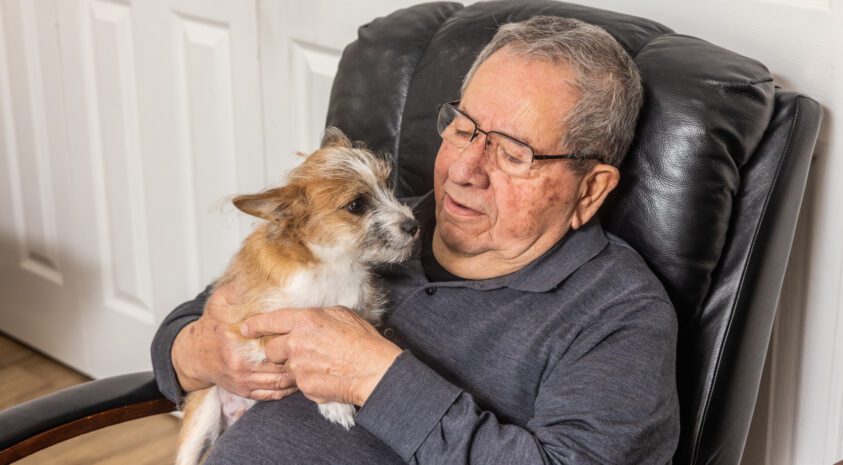Each October, the American Humane Society recognizes Adopt A Shelter Dog Month, highlighting the millions of dogs who are waiting in animal shelters and humane societies across the U.S. for their forever families to come take them home.
The ASPCA estimates that 3.1 million dogs enter animal shelters in the U.S. each year. Around 2 million of those dogs are adopted. But unfortunately, 390,000 dogs are euthanized (or humanely put to sleep).
If you’ve entered your retirement years, you may think your dog-owning days are over. Pets can be expensive and might pose a challenge if you’re planning to travel. And what if you become sick and are unable to care for them?
These are certainly considerations to keep in mind. But there are also major benefits to having a furry companion in retirement — particularly when it comes to adopting a shelter dog. Take a look at these top benefits we want to share.
7 Benefits of Adopting a Shelter Dog in Retirement
1. Improve your physical health
The benefits of owning a dog as a retiree are many and varied! First, a canine companion can help improve your own health. Your dog will need regular exercise, whether that looks like long walks or simply tossing a ball in the backyard. And that translates to exercise for you, too.
2. Save multiple canine lives
You know that when you adopt a dog, you’re potentially saving their life. But did it ever occur to you that you’re saving the life of another dog, too? By adopting a shelter dog, you free up the kennel they were occupying — allowing the animal shelter to take in another dog in need. The shelter can also now take any financial and material resources they were using for your dog and pour them into other dogs.
3. Improve your emotional health
Anyone who has owned a dog knows that dogs help improve our emotional and mental health. There’s nothing like a loyal companion who is always happy to see you.
Your dog will also open up additional opportunities for social interaction with other humans, like veterinarians, groomers, and other dog owners.
4. Find a dog that’s already trained
As a senior adult, you likely don’t want to adopt a puppy or a young, high-energy dog. You want an adult dog that has already been house-trained, socialized around humans and other dogs, and is used to living in a house.
In a shelter, you can find a dog like this. You aren’t starting from scratch with an eight-week-old puppy from a breeder — you can adopt a mature adult dog who is comfortable riding in a car, sleeping in a crate, and following basic obedience commands. This creates a lot less work for you, saving you energy that you simply may not have to spend!
5. Improve your cognitive health
Studies have shown that among older adults who live alone, having a pet is associated with a slower rate of cognitive decline. Dog owners have a lower risk of dementia compared to non-dog owners. Owning a dog can even increase your lifespan. Our pets help us more than we know.
6. Save on costs
If you’re on a fixed income, the cost of acquiring and owning a dog might be a concern. Choosing to adopt a dog from an animal shelter or humane society rather than purchase a purebred dog from a breeder can make a huge difference in this area!
According to PawlicyAdvisor, working with a breeder can set you back $500 to $3,000 per puppy, depending on the breed. On the other hand, shelters charge a nominal fee — say, $50 to $300 per dog. And since you’re saving so much money upfront, this will help stretch your ongoing pet budget long term.
7. Enjoy a support system
When you visit an animal shelter to adopt a dog, you get a lot of information about that dog. It’s different from adopting a young puppy from a breeder and waiting to see what the puppy’s personality will turn out to be.
Instead, the staff and volunteers at the animal shelter can give you a lot of insight into the dog’s personality and, in some cases, into the dog’s life so far. This can help you decide if a certain dog is a good fit for you.
The staff will also happily answer any questions you have. In some cases, they may even be available post-adoption if you need any additional help to get your dog fully settled into their new home.
Best dog breeds for retirees
When you’re adopting, you might not get to choose what dog breed you come home with. It simply depends on which dogs the shelter has that day (and many dogs in animal shelters are mixed breed). That’s okay! The most important thing is giving a dog a safe, loving home.
However, there are some dog breeds that might be naturally better fits for humans in their golden years. If you can, look for these breeds, or mutts with these breeds in them:
- Cavalier King Charles Spaniel. These sweet little spaniels are affectionate, companionable, and easy to keep in an apartment or small home.
- Miniature Schnauzer. Mini Schnauzers range between 11-20 lbs in size. They shed less than many breeds, and while playful, they’re not particularly high-energy.
- Poodle (Standard, Miniature, or Toy). Poodles are smart, loyal, and come in three sizes for you to choose from.
- Golden Retrievers. If you want to stay a little more active, a friendly, lovable Golden Retriever will keep you on your feet.
- Pugs are great snugglers who need minimal exercise. They weigh around 14-18 lbs.
- Boston Terrier. If you’re looking for an extra low-maintenance dog, Boston Terriers have simple grooming and exercise needs.
Tips for taking care of your new dog
Follow these helpful tips for caring for pets in retirement:
- Adjust your budget to accommodate for dog food, veterinary costs, grooming, and other relevant costs
- Plan for your pet’s future in case something happens to you
- Create a routine for your dog and keep it consistent
- If you plan to travel, book pet-friendly lodging, or hire a reliable pet-sitter
If you’re concerned about making a lifetime commitment to a dog and then potentially becoming sick and unable to care for it a few years down the road, consider fostering instead. Many shelters are in need of foster families, where you take a dog into your home on a short-term basis to prepare them for their future home and free up space in the shelter.
This can be a great way to enjoy the love of a dog and provide invaluable help to your community animal shelter or humane society, while knowing it’s not a lifelong commitment on your end.
We’re here for you!
Bankers Life is here to help customers with their financial and insurance needs so please visit us at BankersLife.com to learn more.



